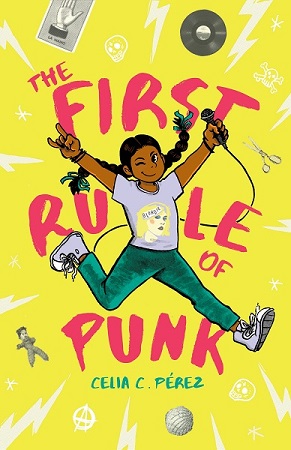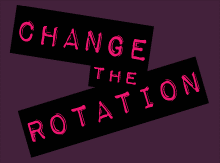Interview with Celia C. Pérez, author of The First Rule of Punk
Phil Collins - August 16, 2017

Chicago librarian Celia C. Pérez releases her first book, The First Rule of Punk, August 22 on Viking Books for Young Readers. The story follows middle school student Malú as she struggles to find herself in a new school. From afar, her father advises her to abide by the first rule of punk: be yourself. Malú finds joy in punk music, zines and skateboarding. Zine pages are included in the book as part of the story. Being a Chicago librarian with a dedicated space to talk about punk, I wanted to ask the author a few questions and chat about the punk librarian life. We talked through email about getting published, punk as part of one's identity, zine collecting, and more.
Women & Children First Bookstore in Andersonville hosts the book launch party for The First Rule of Punk on August 24 at 7:30 p.m. More information on that here.
Phil Collins: First off I want to say congratulations on the book. When did you start writing it and about how long did it take to get to the final product?
Celia C. Pérez:Thank you! I started writing a version of this character's story around 2012. At that time the protagonist, Malú, was a little bit younger than she is in the final book. I scrapped that and decided to rewrite her a little bit older. But it wasn't until late summer 2014 that I settled on the character as a twelve-year-old and wrote what became The First Rule of Punk. I signed with my literary agent in the summer of 2015, and the book sold to Viking last summer. In between summer 2014 and May 2017 there was a lot of revision and editing happening. So, in all, it took about three years from when I began writing this specific story to its publication date of August 2017.
PC: Were you working at your current library throughout the writing process? Was it hard to find time to write while having a day job?
CCP: Yes, I work full time as a librarian. I'm fortunate that I work at an institution where librarians are faculty. We have the same nine-month schedule as other faculty which leaves me with summers off, as well as student breaks like spring break and winter break. A lot of work got done during those breaks. It was still tough to write and work full time, especially once my manuscript was acquired and I was working with deadlines. A lot of work was done in the evenings after my son had gone to bed, especially zine work because unlike a manuscript that I can carry around and work on whenever I have a free moment, zine making for me requires space to spread out and a bunch of supplies all over the place.
PC: Are you still regularly making zines now and were they always in the plan as part of the book?
CCP: I make at least one a year. By zine standards that's pretty regular, right? The last few years it's been a year-in-review zine with an accompanying reading log. The zines were always in the plan for the book. Initially, I was going to have there be one zine with the pages spread out throughout the book. But that plan shifted and eventually became ten individual zines throughout the book that supplement the story and give more insight to the protagonist's thoughts and development.
PC: Including zines contributes to the punk aesthetic in a way that goes deeper than words alone. Do you collect zines at your library?
CCP: We don't collect zines at my library. I've thought about it, and about weaving zine making into my library instruction work. It's something I may try at some point. But we don't have the staffing to maintain this kind of collection. I also have mixed feeling about introducing something I do in my personal time to my work life.
PC: I have heard of some libraries collecting them but there are challenges in cataloging and preservation that make it difficult. Do you find your punk and librarian sides intersecting often, outside of your work time?
CCP: Oh yeah, plenty of libraries collect them and have them circulating or in archives or both which is great! Definitely not something that can't be done, but a little bit of a challenge if you want to maintain the collection in a similar manner as you would other materials but don't have the resources. You know, for most of my professional life I have really kept my punk / zine / non-work interests separate from work. I admire people who combine the two, especially because I imagine it makes your professional work feel even more fulfilling. Although, come to think of it, most of the zine readings I've done have been done with other librarians. I've done a few readings at Quimby's with other zine librarians and librarians who make zines, including one during ALA [the American Library Association conference]. I also read at ALA annual a few years ago. The zine tour I was part of was done with other zine making / zine librarians and we traveled in a zine mobile. So there has been some "cross contamination" I guess.
PC: I know I occasionally find my librarian sensibilities creeping into what I do here on the site and vice versa. I think that speaks to an aspect of identity, which is a theme in The First Rule of Punk.
CCP: Yeah, definitely. I feel like I've always struggled with integrating different areas of my life--writer, librarian, zinester--on top of constantly thinking about how I fit those identities as a person of color. And the book never uses the term intersectionality, but it is very much about how we integrate and embrace different parts of what make us who we are. For Malú, the protagonist, it's about figuring out how being Mexican American and biracial and a girl punk all fit together. She initially sees them as these parts of her that don't match or make sense together.
PC: A lot of people connect with punk through some sort of disenchantment with mainstream culture or society. We make our own culture instead. How did you find punk?
CCP: That's interesting that you mention punk being about making our own culture because this is another thing I was thinking about when writing my book. I was listening to an episode of this NPR podcast called Code Switch and they interviewed a professor from Stanford's Martin Luther King Institute, Clayborne Carson, who said, "Culture is both a return to an imagined past, and it's also a revolutionary act of creating a culture that fits your needs for the future." I think about this a lot because I'm second generation, meaning I'm of the first generation in my family to be born in the U.S., and because I'm bicultural--my dad is Cuban and my mom is Mexican. So I've never felt like there was a clear cut "culture" that fit me one hundred percent (or even close). And I think for me that was definitely one of the attractions to punk. I found punk when I left home for college and lived in a small college town with a thriving scene. I was drawn to its energy and do-it-yourself philosophy. I like the idea of creating what you need or want, but don't see in the world. Culture for me is both my ethnic heritage, but also these other things that are a part of me like my interests in reading and writing and music and making things. Growing up, my culture was watching Latin American telenovelas and listening to Beny Moré, but also reading Sweet Valley High and listening to hair metal.
PC: Did you go to college in the Midwest? Are there any bands from that scene we should check out?
CCP: No, I attended the University of Florida in Gainesville, Florida. I'm originally from Miami, and Gainesville is about a six hour drive north, smack in the middle of the state. Gainesville is also the home of No Idea Records and they used to put out a fanzine which was one of my introductions to the local scene. The first No Idea fanzine I bought at a local record store came with two 7" records that included Samiam and Jawbreaker on one record and four local bands, Radon, Spoke, Bombshell, and Gruel on the other one.
PC: Gainesville has been a hotbed of punk for awhile, no wonder you got into punk there. Do you have any favorite local bands or places to see shows here in Chicago?
CCP: Sadly, I don't really go out to shows much, and I haven't kept up with local music here even though I'm curious about the Pilsen punk scene because I'm always interested in Latinos and other people of color participating in punk. But by the time I moved to Chicago in 2001 I had sort of moved past my days of staying out late for shows. Now I have a kid and I just don't really like being out at clubs at night especially if it means having to hop on the train or bus. When we first moved here we lived in Logan Square and they still had shows at the Fireside Bowl and we'd sometimes go there. That, or maybe the Empty Bottle, was probably the last small venue type space where I saw shows. Now, if I go out to see a band play it's mostly to see a band I never got to see back in the day, where I know this may be the last chance. But they usually play places like the Metro where you're just packed in and can't sit your old ass down. I hope young readers don't think this is what happens to everyone when you get old. Haha. Anyway, I'm sure there are a lot of great local punk bands thriving today. If I had to name two favorite local bands, neither has been a band in a long time, it's probably Los Crudos and Seam, who were more of an indie rock band.
PC: Yes. I used to go on crazy runs of eight shows in nine days from time to time and I don't think I have another stretch like that in me haha. I did get lucky enough to see Los Crudos when they played at the No Delusions documentary release party a couple years ago. They are definitely a band to catch if they pull any more special one-off shows like that. So you have your book launch party coming up at Women & Children First on August 24. Is there anything people need to know about that or any other events we should be on the lookout for?
CCP: That's awesome! Martin's Mas Alla de los Gritos documentary was super inspiring.
Yeah, the book comes out on the 22nd, and the book launch is on the 24th at Women & Children First, an indie bookstore in the Andersonville neighborhood. It's a free event so all are welcome and encouraged to come. I'll be talking about the book, reading, answering questions, signing.
I don't have any local stuff happening right now, other than the book launch, but there's a zine fest happening on the 20th (not sure when this will come out) in Logan Square that sounds cool, and I hope to check out. It's ZINEmercado-the Logan Square Independent Zine Fest and it's taking place at Comfort Station in Logan Square.
Celia C. Pérez will be at the Brooklyn Book Festival on September 16th; at the Heartland Fall Forum (Lombard, IL) on October 12; and at the Tweens Read Festival (Houston, TX) on October 21.
